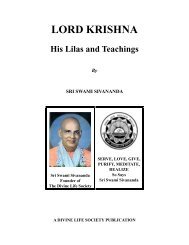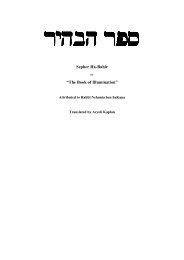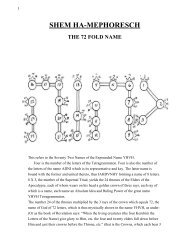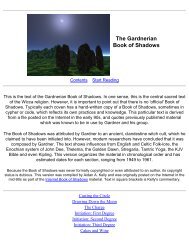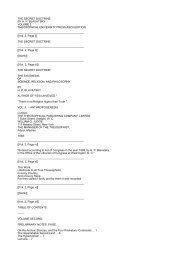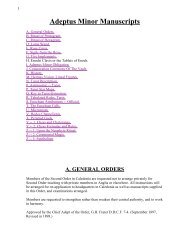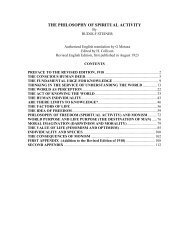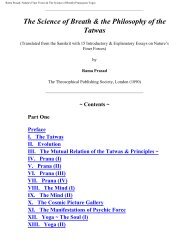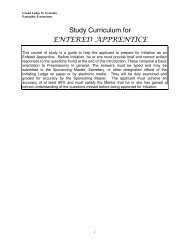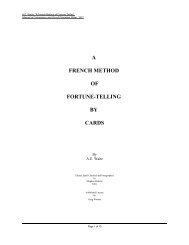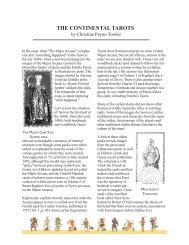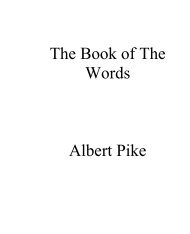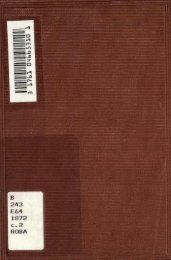You also want an ePaper? Increase the reach of your titles
YUMPU automatically turns print PDFs into web optimized ePapers that Google loves.
The Abode Of The Blessed.<br />
7. Ibid., t. iv., p. 55 (l. 475).<br />
8. Ibid., t. iv., p. 68 (l. 567).<br />
9 Ibid., t. iv., p. 69 (l. 576 ff.).]<br />
{p. cvi}<br />
Power <strong>of</strong> <strong>the</strong> gods <strong>of</strong> Annu.<br />
The souls <strong>of</strong> <strong>the</strong> dead could also be commended to <strong>the</strong> care <strong>of</strong> <strong>the</strong> gods above by <strong>the</strong> gods <strong>of</strong> Annu, and<br />
thus we find it said in <strong>the</strong> pyramid <strong>of</strong> Unas: "O gods <strong>of</strong> <strong>the</strong> west, O gods <strong>of</strong> <strong>the</strong> east, O gods <strong>of</strong> <strong>the</strong> south,<br />
O gods <strong>of</strong> <strong>the</strong> north, ye four [orders <strong>of</strong> gods] who embrace <strong>the</strong> four holy ends <strong>of</strong> <strong>the</strong> universe, and who<br />
granted to Osiris to come forth to heaven, and to sail over <strong>the</strong> celestial waters <strong>the</strong>re<strong>of</strong> with his son Horus<br />
by his side to protect him and to make him to rise like a great god from <strong>the</strong> celestial deep, say ye to Unas,<br />
'Behold Horus, <strong>the</strong> son <strong>of</strong> Osiris, behold Unas, <strong>the</strong> god <strong>of</strong> <strong>the</strong> aged gods, <strong>the</strong> son <strong>of</strong> Hathor, behold <strong>the</strong><br />
seed <strong>of</strong> Seb, for Osiris hath commanded that Unas shall rise like <strong>the</strong> second <strong>of</strong> Horus, and <strong>the</strong> four khu's<br />
who are in Annu have written this command to <strong>the</strong> great gods who are in <strong>the</strong> celestial waters.'"[1] And<br />
again, "When men are buried and receive <strong>the</strong>ir thousands <strong>of</strong> cakes and thousands <strong>of</strong> vases <strong>of</strong> ale upon <strong>the</strong><br />
table <strong>of</strong> him that ruleth in Amenta, that being is in sore straits who hath not a written decree: now <strong>the</strong><br />
decree <strong>of</strong> Unas is under <strong>the</strong> greatest, and not under <strong>the</strong> little seal."[2]<br />
The plan <strong>of</strong> <strong>the</strong> Sekhet-Hetep which we find in <strong>the</strong> <strong>Book</strong> <strong>of</strong> <strong>the</strong> <strong>Dead</strong> during <strong>the</strong> Theban period will be<br />
described below, and it is <strong>the</strong>refore sufficient to say here that <strong>the</strong> ideas <strong>of</strong> <strong>the</strong> happy life which <strong>the</strong><br />
deceased led had <strong>the</strong>ir origin in <strong>the</strong> pyramid texts, as may be seen from <strong>the</strong> following passage:--"Unas<br />
hath <strong>of</strong>fered incense unto <strong>the</strong> great and little companies <strong>of</strong> <strong>the</strong> gods, and his mouth is pure, and <strong>the</strong><br />
tongue which is <strong>the</strong>rein is pure. O ye judges, ye have taken Unas unto yourselves, let him eat that which<br />
ye eat, let him drink that which ye drink, let him live upon that which ye live upon, let your seat be his<br />
seat, let his power be your power, let <strong>the</strong> boat wherein he shall sail be your boat, let him net birds in<br />
Aaru, let him possess running streams in Sekhet-Hetep, and may he obtain his meat and his drink from<br />
you, O ye gods. May <strong>the</strong> water <strong>of</strong> Unas be <strong>of</strong> <strong>the</strong> wine which is <strong>of</strong> Ra, may he revolve in <strong>the</strong> sky like Ra,<br />
and may he pass over <strong>the</strong> sky like Thoth."[3]<br />
Of <strong>the</strong> condition <strong>of</strong> those who failed to secure a life <strong>of</strong> beatitude with <strong>the</strong> gods in <strong>the</strong> Sekhet-Aaru <strong>of</strong> <strong>the</strong><br />
Tuat, <strong>the</strong> pyramid texts say nothing, and it seems as if <strong>the</strong> doctrine <strong>of</strong> punishment <strong>of</strong> <strong>the</strong> wicked and <strong>of</strong><br />
<strong>the</strong> judgment which took place after death is a development characteristic <strong>of</strong> a later period.<br />
[1. Recueil de Travaux, t. iv., p. 69 (ll. 572-75).<br />
2 Ibid., t. iv., p. 71 (l. 583).<br />
3 Ibid., t. iii. (l. 191-95).]<br />
{p. cvii}<br />
Next: The Gods Of The <strong>Book</strong> Of The <strong>Dead</strong>.<br />
http://www.sacred-texts.com/egy/ebod/ebod08.htm (4 <strong>of</strong> 4) [8/10/2001 11:23:43 AM]



